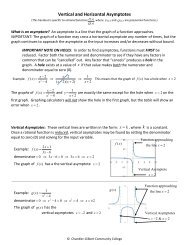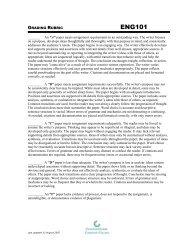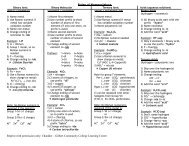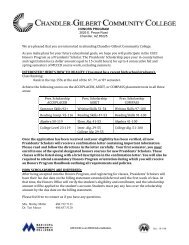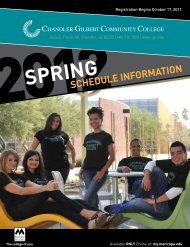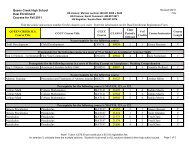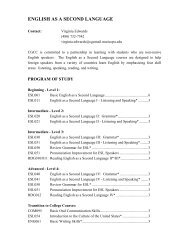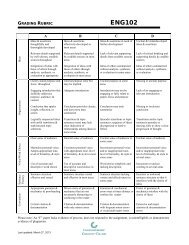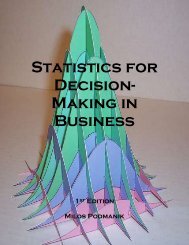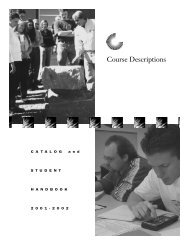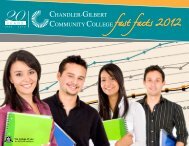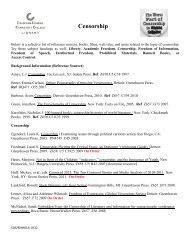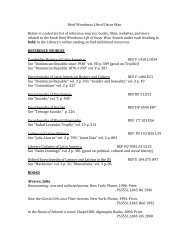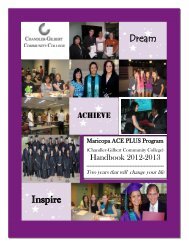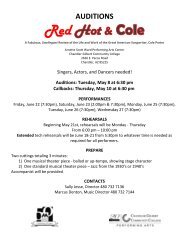Tutor Training Manual.indd - Chandler-Gilbert Community College
Tutor Training Manual.indd - Chandler-Gilbert Community College
Tutor Training Manual.indd - Chandler-Gilbert Community College
You also want an ePaper? Increase the reach of your titles
YUMPU automatically turns print PDFs into web optimized ePapers that Google loves.
Trends in Adult Learning<br />
27<br />
A variety of sources provide us with a body of fairly reliable knowledge about adult learning.<br />
This knowledge might be divided into three basic divisions: things we know about adult<br />
learners and their motivation, things we know about designing curriculum for adults, and<br />
things we know about working with adults in the classroom.<br />
• Adults seek out learning experiences in order to cope with specific life-changing events-<br />
-e.g., marriage, divorce, a new job, a promotion, being fired, retiring, losing a loved one,<br />
moving to a new city.<br />
• Adults who are motivated to seek out a learning experience do so primarily because they<br />
have a use for the knowledge or skill being sought. Learning is a means to an end, not an<br />
end in itself.<br />
• Increasing or maintaining one’s sense of self-esteem and pleasure are strong secondary<br />
motivators for engaging in learning experiences.<br />
• Adults need to be able to integrate new ideas with what they already know if they are<br />
going to keep - and use - the new information.<br />
• Information that conflicts sharply with what is already held to be true, and thus forces a<br />
re-evaluation of the old material, is integrated more slowly.<br />
• Information that has little “conceptual overlap” with what is already known is acquired<br />
slowly.<br />
• Adults tend to compensate for being slower in some psychomotor learning tasks by<br />
being more accurate and making fewer trial-and-error ventures.<br />
• Adults tend to take errors personally and are more likely to let them affect self-esteem.<br />
Therefore, they tend to apply tried-and-true solutions and take fewer risks.<br />
• Regardless of media, straightforward how-to is the preferred content orientation.<br />
Adults cite a need for application and how-to information as the primary motivation for<br />
beginning a learning project.<br />
• The learning environment must be physically and psychologically comfortable; long<br />
lectures, periods of interminable sitting and the absence of practice opportunities rate<br />
high on the irritation scale.<br />
• Adults have something real to lose in a classroom situation. Self-esteem and ego are on<br />
the line when they are asked to risk trying a new behavior in front of peers and cohorts.<br />
Bad experiences in traditional education, feelings on authority and the preoccupation<br />
with events outside the classroom affect in-class experience.<br />
• Adults bring a great deal of life experience into the classroom, an invaluable asset to be<br />
acknowledged, tapped and used. Adults can learn well -and much - from dialogue with<br />
respected peers.<br />
• New knowledge has to be integrated with previous knowledge; students must actively<br />
participate in the learning experience. The learner is dependent on the instructor for<br />
confirming feedback on skill practice; the instructor is dependent on the learner for<br />
feedback about curriculum and in-class performance.<br />
• Integration of new knowledge and skill requires transition time and focused effort on<br />
application.<br />
http://adulted.about.com/cs/learningtheory/a/lrng_patterns.htm<br />
http://honolulu.hawaii.edu/intranet/committees/FacDevCom/guidebk/teachtip/adults-3.htm



